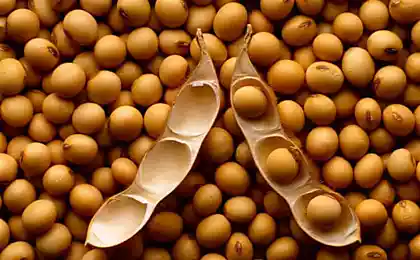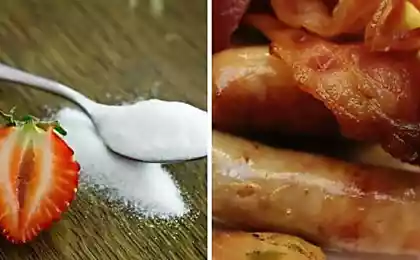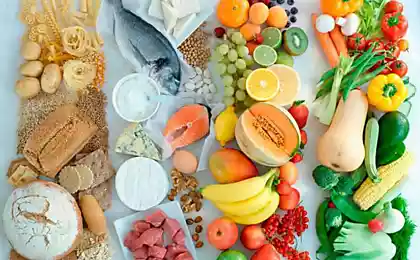636
Fifteen of harmful products disguised as dietary food
Unhealthy food is the main reason that the civilized world today suffering from obesity and disease like never in history. Surprisingly, some of these harmful products definitely a lot of people consider a diet.

We offer you a list of the most common unhealthy "health food products".
1. Semi-finished products with the labels "low fat" and "low fat"
Years of "war" against saturated fat was a major mistake in the history of nutrition. Its ideological basis was originally incorrect scientific data, which is currently completely refuted.
However, when it started, producers of semi-finished products rapidly, that is, "stood on the side of the victors," and dramatically expanded the manufacture of low-fat products.
However, they are faced with a huge problem: the food from which they removed the fat, the taste was just disgusting! And then she had to add sugar and other questionable ingredients to ensure edibility.
Actually, saturated fats in reasonable quantities are completely harmless, while excessive consumption of sugar sometimes causes irreparable health damage.
It is important to remember that the words "low fat" and "low fat" mean that it is a product of technological processing with the addition of sugar.
2. The most "hyped" salad condiments and sauces
Vegetables are incredibly healthy. The problem is that in pure form they are not tasty. So most people used to use various salad dressings with a pleasant taste to turn a bland meal into a gourmet dish.
However, many of these dressings and sauces are composed of harmful ingredients such as sugar, vegetable oils and so-called "TRANS fats" (unsaturated fats), as well as many synthetic additives.
Despite the obvious benefits of vegetables to human body, eat them together with sauces containing a number of harmful substances, produces negative brand exposure and completely negates the useful properties of salads. You need to be very careful and always carefully study the salad sauce in the store before buying. And even better to do it yourself, avoiding harmful ingredients.
3. "Fruit juices" that are actually mainly composed of dissolved sugar in the
Any of us knows from childhood that fruit juices are good for health. So it must be, because they are made from fruit, right? Unfortunately, the majority of fruit juice standing on the supermarket shelves, in fact they are not. Sometimes they do not contain any fruit, only chemicals with a fruity taste. So often we drink instead of juice is just sugar water with the taste of a fruit depicted on the box.
Even if it says "100% fruit juice", it is better to avoid such drinks. Fruit juice is the same as the fruits, which have removed such a useful thing as fiber and many other... the main thing that remains in it from fruit is the sugar. Maybe not all know, but the sugar content of the juice is approximately the same as in sweet drinks.
4. "Heart-healthy" whole-wheat flour
Most products labeled "whole wheat flour" is actually not made from such flour. The fact that for their production the grain is still milled and transformed into very fine flour. And she, once in the body, and also sharply raises blood sugar, as its main competitor – flour fine grinding.
In fact, diet whole grain bread has the same glycemic index as regular white bread.
Alas, even a real whole-wheat bread is not so good... because modern wheat is not as useful as the one that ate our grandparents. The fact that about 1960, scientists have found a way to increase the yield of wheat by changing its genetic composition. Therefore, modern wheat is less nutritious and has some properties that make it dangerous for people intolerant to gluten.
Some studies also show that modern wheat may cause inflammation and increases the level of cholesterol, at least in comparison with older varieties.
Although in the past wheat has been a relatively healthy product, modern products that feed the most people, certainly not be called a diet. They are generally better to avoid.
5. Phytosterols, reducing cholesterol level
There is a group of nutrients called phytosterols, which are a plant version of cholesterol. Scientific studies have shown that they can reduce the level of cholesterol in the blood. So they are often added to products which are marked as "lowers cholesterol" and go to the category of dietetic foods to reduce the risk of cardiovascular diseases.
However, recent new studies have led to the conclusion that instead of reducing the level of cholesterol, phytosterols exert an opposite effect on the cardiovascular system and may even increase the risk of heart attack and death.
6. Margarine
At the time of the butter made a real fright because of the high content of saturated fat. Many nutritionists have begun to promote instead of margarine. In those days, margarine was largely of TRANS fats. Today's counterparts contain less of them, however, is still made mainly from refined vegetable fats.
Margarine, strictly speaking, food is not. This is a set of chemicals and vegetable oils made to look and taste like food. So, no wonder that started in 1948 in the American city of Framingham, Massachusetts, long-term study of the problems of the cardiovascular system (which, incidentally, is still ongoing) showed that people who replaced butter in the diet margarine more likely to die on t heart failure and other heart diseases.
Thus, wishing to extend their lives should use only butter (preferably from whole milk from the cow, translated into pasture), and like the plague to flee from margarine and other similar fake products.
Today, the story of the transition to margarine and TRANS fats is considered the biggest stain on the reputation of nutritionists.
7. Drinks for athletes
Sports drinks were developed for athletes, so they contain electrolytes (salts) and sugar, which can be useful for athletes with increased loads.
However... most of us regular people, not need any additional amount of salt and absolutely no shortage of liquid sugar.
Despite the fact that sports drinks are considered to be less harmful than regular sweet drinks, in fact, no significant difference between them, except for a slightly lower sugar concentration.
Of course, to replenish fluids in the body needs, especially during physical exertion, most people, however far better would be to do this using drinking water.
8. Harmful products with reduced carbohydrate content
Low carbohydrate diets have become extremely popular in the last few decades. Already in this century, one study after another confirms that it is an effective way to reduce weight and improve health.
However... food manufacturers have quickly caught this trend and dumped on the market a lot of "useful" semi-finished products with the lowered maintenance of carbohydrates. Among them are a variety of chocolate bars. If you look at the list of ingredients, it is easy to see that there is practically no food, some chemicals and refined ingredients.
These products can be used from case to case without any damage to the metabolism. However, they have almost nothing to feed the body, so, despite the low carbohydrate content of this food is nevertheless harmful to health.
9. Nectar from the agave plant
After learning about the harmful effects of sugar, many people began to look for an alternative. One of the most popular "natural sweeteners" is agave nectar, also called syrup. It can be seen in stores of the diet, often with attractive slogans on the packaging.
However, the problem is that the syrup is no better than sugar, and actually it is much worse. While sugar contains about 50 percent fructose, agave syrup it even more, up to 70-90 percent. Thus, when used in the same amounts, it brings much more harm to the body.
As you can see, "natural" does not mean useful, and in addition, the assertion of its naturalness also is very controversial.
10. Junk food for staunch vegetarians
Strict vegetarianism is very popular these days diet, which many are based on ethical or environmental considerations. However, it is often promoted as beneficial to health, and it is very doubtful. On the market there are many semi-finished products for strict vegetarians, who are often sold as substitutes for conventional, non-vegetarian food. An example is bacon for vegetarians. However, you should take into account that all such products is the result of technological processing, this means that they are harmful to any person, including, of course, and for the strict vegetarian.
11. Syrup brown rice
Syrup brown rice (also known as rice syrup) is a sweetener that is mistakenly considered to be useful. It is obtained by processing the cooked rice with enzymes that break down starch to simple sugars. Syrup of brown rice contains no refined fructose, just glucose. The absence of fructose – a good quality, however the glycemic index of the syrup – about 98, and this means that glucose it rapidly raises the blood sugar level of a person.
In addition, the syrup of brown rice – product of deep processing, not contain almost no nutrients. In other words it's "empty" calories. Recently there have been disturbing reports about the presence in it of salts of arsenic, which is another good reason to be extremely careful with him. Moreover, there are other low-calorie sweeteners such as erythritol or xylitol, which actually have some useful properties.
12. Technologically processed organic products
Sorry, the word "organic" has in recent years become a fashionable marketing term. Food manufacturers have invented many ways to do the same stuff out of anything, including those ingredients that are considered organic.
Among them, cane raw sugar, which is actually 100% identical to regular sugar. There is also a mixture of fructose and glucose, with almost no nutrients. In many cases, the difference between a food ingredient and it's organic competitor is close to zero.
Technologically processed products with the label "organic" is not always useful, so you should always carefully read their composition to find out what is actually inside.
13. Vegetable oil
You can often hear about the benefits of oils from seeds and plants. For example, oil from soybeans, canola oil, grape seed oil and so on. These statements are based on the ability of vegetable oils to reduce the level of cholesterol in blood, at least in the short term. However, it is important to remember that cholesterol is only a risk factor, but not the disease itself.
Even assuming that the vegetable oil reduces the risk factor, there is no guarantee that it can prevent diseases such as angina or a heart attack. In fact, several experiments in recent years showed that despite decrease in level of cholesterol, these oils can increase the risk of death... from a heart attack or cancer.
Conclusion: the need to eat natural fats like butter, coconut and olive oil, avoiding processed vegetable fats.
14. Gluten-free unhealthy foods
Many people recently to carefully avoid products containing gluten. Some experts believe that this is not necessary, however, the truth is that gluten can cause damage to the health of a large number of people.
No wonder that in the market there are many "gluten-free" products. The problem is that they are no better than their "gluten-containing" brethren, even worse. The reason is that they are the result of deep processing, and therefore does not contain nutrients, are often made of refined starches, which leads to a spike in blood sugar levels.
So, you should eat those foods that do not contain gluten initially, both plant and animals, but in any case not "gluten-free" products.
15. Breakfast cereals deep processing
Methods of promotion on the market of Breakfast cereals – sample dishonest behavior. Many of them, including those that are intended for baby food, just pasted "diet" slogans, including completely false, like "whole flour" or "low in fat".
However, if you look at the list of ingredients, there's almost nothing but fine flour, sugar and artificial food additives.
The sad truth of our day is that if the packaging says "diet product", actually this could be a hoax. These diet foods are those which do not need such labels... and yet, they usually consist of just one ingredient.
источник:mixednews.ru
Source: /users/1077

We offer you a list of the most common unhealthy "health food products".
1. Semi-finished products with the labels "low fat" and "low fat"
Years of "war" against saturated fat was a major mistake in the history of nutrition. Its ideological basis was originally incorrect scientific data, which is currently completely refuted.
However, when it started, producers of semi-finished products rapidly, that is, "stood on the side of the victors," and dramatically expanded the manufacture of low-fat products.
However, they are faced with a huge problem: the food from which they removed the fat, the taste was just disgusting! And then she had to add sugar and other questionable ingredients to ensure edibility.
Actually, saturated fats in reasonable quantities are completely harmless, while excessive consumption of sugar sometimes causes irreparable health damage.
It is important to remember that the words "low fat" and "low fat" mean that it is a product of technological processing with the addition of sugar.
2. The most "hyped" salad condiments and sauces
Vegetables are incredibly healthy. The problem is that in pure form they are not tasty. So most people used to use various salad dressings with a pleasant taste to turn a bland meal into a gourmet dish.
However, many of these dressings and sauces are composed of harmful ingredients such as sugar, vegetable oils and so-called "TRANS fats" (unsaturated fats), as well as many synthetic additives.
Despite the obvious benefits of vegetables to human body, eat them together with sauces containing a number of harmful substances, produces negative brand exposure and completely negates the useful properties of salads. You need to be very careful and always carefully study the salad sauce in the store before buying. And even better to do it yourself, avoiding harmful ingredients.
3. "Fruit juices" that are actually mainly composed of dissolved sugar in the
Any of us knows from childhood that fruit juices are good for health. So it must be, because they are made from fruit, right? Unfortunately, the majority of fruit juice standing on the supermarket shelves, in fact they are not. Sometimes they do not contain any fruit, only chemicals with a fruity taste. So often we drink instead of juice is just sugar water with the taste of a fruit depicted on the box.
Even if it says "100% fruit juice", it is better to avoid such drinks. Fruit juice is the same as the fruits, which have removed such a useful thing as fiber and many other... the main thing that remains in it from fruit is the sugar. Maybe not all know, but the sugar content of the juice is approximately the same as in sweet drinks.
4. "Heart-healthy" whole-wheat flour
Most products labeled "whole wheat flour" is actually not made from such flour. The fact that for their production the grain is still milled and transformed into very fine flour. And she, once in the body, and also sharply raises blood sugar, as its main competitor – flour fine grinding.
In fact, diet whole grain bread has the same glycemic index as regular white bread.
Alas, even a real whole-wheat bread is not so good... because modern wheat is not as useful as the one that ate our grandparents. The fact that about 1960, scientists have found a way to increase the yield of wheat by changing its genetic composition. Therefore, modern wheat is less nutritious and has some properties that make it dangerous for people intolerant to gluten.
Some studies also show that modern wheat may cause inflammation and increases the level of cholesterol, at least in comparison with older varieties.
Although in the past wheat has been a relatively healthy product, modern products that feed the most people, certainly not be called a diet. They are generally better to avoid.
5. Phytosterols, reducing cholesterol level
There is a group of nutrients called phytosterols, which are a plant version of cholesterol. Scientific studies have shown that they can reduce the level of cholesterol in the blood. So they are often added to products which are marked as "lowers cholesterol" and go to the category of dietetic foods to reduce the risk of cardiovascular diseases.
However, recent new studies have led to the conclusion that instead of reducing the level of cholesterol, phytosterols exert an opposite effect on the cardiovascular system and may even increase the risk of heart attack and death.
6. Margarine
At the time of the butter made a real fright because of the high content of saturated fat. Many nutritionists have begun to promote instead of margarine. In those days, margarine was largely of TRANS fats. Today's counterparts contain less of them, however, is still made mainly from refined vegetable fats.
Margarine, strictly speaking, food is not. This is a set of chemicals and vegetable oils made to look and taste like food. So, no wonder that started in 1948 in the American city of Framingham, Massachusetts, long-term study of the problems of the cardiovascular system (which, incidentally, is still ongoing) showed that people who replaced butter in the diet margarine more likely to die on t heart failure and other heart diseases.
Thus, wishing to extend their lives should use only butter (preferably from whole milk from the cow, translated into pasture), and like the plague to flee from margarine and other similar fake products.
Today, the story of the transition to margarine and TRANS fats is considered the biggest stain on the reputation of nutritionists.
7. Drinks for athletes
Sports drinks were developed for athletes, so they contain electrolytes (salts) and sugar, which can be useful for athletes with increased loads.
However... most of us regular people, not need any additional amount of salt and absolutely no shortage of liquid sugar.
Despite the fact that sports drinks are considered to be less harmful than regular sweet drinks, in fact, no significant difference between them, except for a slightly lower sugar concentration.
Of course, to replenish fluids in the body needs, especially during physical exertion, most people, however far better would be to do this using drinking water.
8. Harmful products with reduced carbohydrate content
Low carbohydrate diets have become extremely popular in the last few decades. Already in this century, one study after another confirms that it is an effective way to reduce weight and improve health.
However... food manufacturers have quickly caught this trend and dumped on the market a lot of "useful" semi-finished products with the lowered maintenance of carbohydrates. Among them are a variety of chocolate bars. If you look at the list of ingredients, it is easy to see that there is practically no food, some chemicals and refined ingredients.
These products can be used from case to case without any damage to the metabolism. However, they have almost nothing to feed the body, so, despite the low carbohydrate content of this food is nevertheless harmful to health.
9. Nectar from the agave plant
After learning about the harmful effects of sugar, many people began to look for an alternative. One of the most popular "natural sweeteners" is agave nectar, also called syrup. It can be seen in stores of the diet, often with attractive slogans on the packaging.
However, the problem is that the syrup is no better than sugar, and actually it is much worse. While sugar contains about 50 percent fructose, agave syrup it even more, up to 70-90 percent. Thus, when used in the same amounts, it brings much more harm to the body.
As you can see, "natural" does not mean useful, and in addition, the assertion of its naturalness also is very controversial.
10. Junk food for staunch vegetarians
Strict vegetarianism is very popular these days diet, which many are based on ethical or environmental considerations. However, it is often promoted as beneficial to health, and it is very doubtful. On the market there are many semi-finished products for strict vegetarians, who are often sold as substitutes for conventional, non-vegetarian food. An example is bacon for vegetarians. However, you should take into account that all such products is the result of technological processing, this means that they are harmful to any person, including, of course, and for the strict vegetarian.
11. Syrup brown rice
Syrup brown rice (also known as rice syrup) is a sweetener that is mistakenly considered to be useful. It is obtained by processing the cooked rice with enzymes that break down starch to simple sugars. Syrup of brown rice contains no refined fructose, just glucose. The absence of fructose – a good quality, however the glycemic index of the syrup – about 98, and this means that glucose it rapidly raises the blood sugar level of a person.
In addition, the syrup of brown rice – product of deep processing, not contain almost no nutrients. In other words it's "empty" calories. Recently there have been disturbing reports about the presence in it of salts of arsenic, which is another good reason to be extremely careful with him. Moreover, there are other low-calorie sweeteners such as erythritol or xylitol, which actually have some useful properties.
12. Technologically processed organic products
Sorry, the word "organic" has in recent years become a fashionable marketing term. Food manufacturers have invented many ways to do the same stuff out of anything, including those ingredients that are considered organic.
Among them, cane raw sugar, which is actually 100% identical to regular sugar. There is also a mixture of fructose and glucose, with almost no nutrients. In many cases, the difference between a food ingredient and it's organic competitor is close to zero.
Technologically processed products with the label "organic" is not always useful, so you should always carefully read their composition to find out what is actually inside.
13. Vegetable oil
You can often hear about the benefits of oils from seeds and plants. For example, oil from soybeans, canola oil, grape seed oil and so on. These statements are based on the ability of vegetable oils to reduce the level of cholesterol in blood, at least in the short term. However, it is important to remember that cholesterol is only a risk factor, but not the disease itself.
Even assuming that the vegetable oil reduces the risk factor, there is no guarantee that it can prevent diseases such as angina or a heart attack. In fact, several experiments in recent years showed that despite decrease in level of cholesterol, these oils can increase the risk of death... from a heart attack or cancer.
Conclusion: the need to eat natural fats like butter, coconut and olive oil, avoiding processed vegetable fats.
14. Gluten-free unhealthy foods
Many people recently to carefully avoid products containing gluten. Some experts believe that this is not necessary, however, the truth is that gluten can cause damage to the health of a large number of people.
No wonder that in the market there are many "gluten-free" products. The problem is that they are no better than their "gluten-containing" brethren, even worse. The reason is that they are the result of deep processing, and therefore does not contain nutrients, are often made of refined starches, which leads to a spike in blood sugar levels.
So, you should eat those foods that do not contain gluten initially, both plant and animals, but in any case not "gluten-free" products.
15. Breakfast cereals deep processing
Methods of promotion on the market of Breakfast cereals – sample dishonest behavior. Many of them, including those that are intended for baby food, just pasted "diet" slogans, including completely false, like "whole flour" or "low in fat".
However, if you look at the list of ingredients, there's almost nothing but fine flour, sugar and artificial food additives.
The sad truth of our day is that if the packaging says "diet product", actually this could be a hoax. These diet foods are those which do not need such labels... and yet, they usually consist of just one ingredient.
источник:mixednews.ru
Source: /users/1077
Compilation of failures at work – a video that will not leave anyone indifferent
Why you need a garbage sorting























